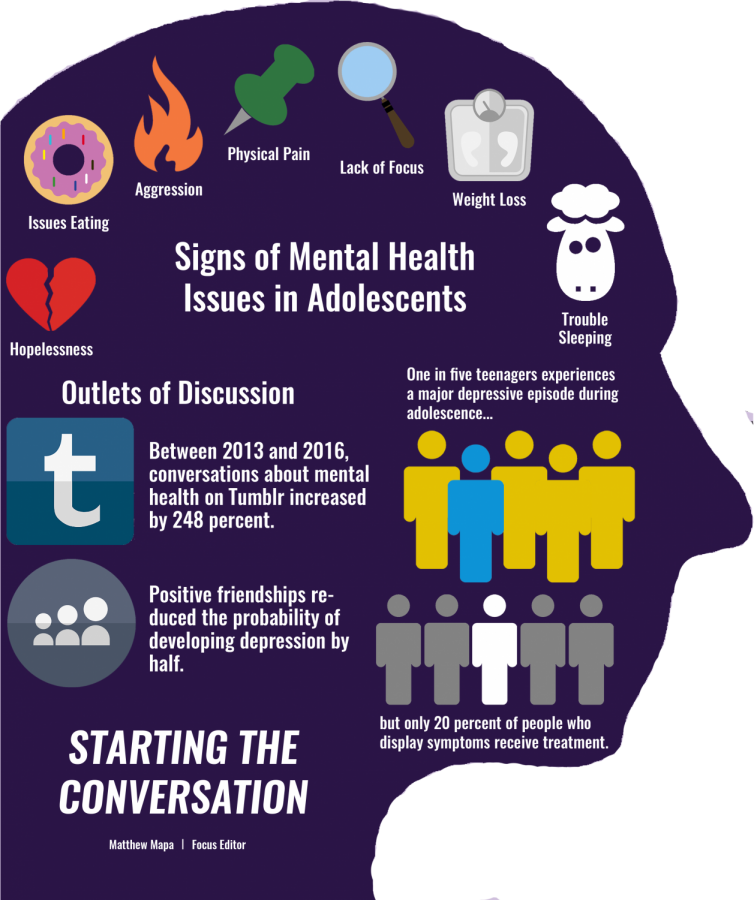High school is a difficult time for teenagers. The greater emphasis on academic performance and less time available puts students through a grinder, creating emotional stress that needs release or even mental health care. However, it’s impossible to help someone who does not share.
“You can’t see an emotion,” psychology teacher Donna Walker said. “Even if I’m frowning, for all you know I’m acting. Even if I appear happy, for all you know I’m clinically depressed.”
Unfortunately, some emotions are classified as either “good” or “bad,” rather than natural and inevitable. Instead of viewing unfortunate situations as a source of frustration or hopelessness, students are told to “just stay positive” and suppress any feelings that aren’t positive.
Of course, it’s not a bad thing to be happy.
“I think everyone wants to be happy,” junior Ashley Mason said.
However, the problem arises when we go out of our way to only feel happy and attempt to avoid other emotions. Not only does it create a sense of false positivity, but a full range of emotions is essential for proper development.
“Emotions are absolutely fundamental to our long-term success – our grit, our ability to self-regulate, to negotiate conflict and to solve problems,” psychologist and Harvard instructor Susan David said during a TedTalk in 2017. “They influence our relationships and our ability to be effective in our jobs.”
Another factor that plays a role in the black-and-white perception of emotions is the values that are taught during childhood, when the human brain, specifically the prefrontal cerebral cortex, is still in the early stages of development.
“Your prefrontal cerebral cortex is mitigating all the activity right behind it in your brain in an area called the limbic system, which is the emotional control center of your brain,” Walker said. “Because younger children don’t have well-developed prefrontal cerebral cortexes, their limbic system is running around rampant like a gorilla in a china store.”
Rather than being told to embrace and accept their emotions in childhood, children are taught by their parents and teachers what emotions they should or shouldn’t feel.
“We still struggle with [the idea that] men don’t cry,” Walker said. “Boys are told to suck it up, and girls are permitted to cry and express emotions. I think we’re moving past that, but it still certainly exists.”
Some people try to avoid expressing negative feelings in order to conform to societal expectations or feel better about themselves, but this only exacerbates the problem and creates additional stress.
“It’s pretty harmful to not express emotions right away because then it builds up until it explodes,” Mason said.
In some cases, suppressing emotions can lead to relationship and even health issues.
“Stifling emotions like anger, rage, [or] grief can lead to psychosomatic problems,” Walker said. “You can start having headaches, stomach aches, stomach upset, diarrhea.”
Middle school counselor Rylan Smith finds the best way to prevent these problems is by remembering that other people care.
“Ultimately, your teachers, your parents and your friends want what’s best for you, and we don’t expect you to fit into some kind of mold,” Smith said. “Your feelings are real, and when you need help you need to seek it out. You’ve got to own some of that and not get caught up in the constructs that society presents.”
Walker encourages sharing emotions with other teenagers.
“Knowing that teenagers suffer from this [belief that], ‘I’m the only person who feels this way,’ and, ‘No one understands what I’m going through,’ it’s just not true,” Walker said. “I think kids would be really shocked if they shared with each other. [So] often they’re gonna get an answer back like, ‘No way! Me too!’”



